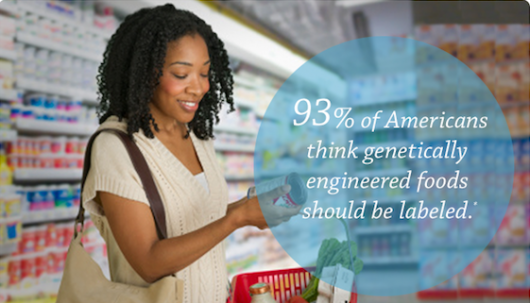There’s been a lot of buzz lately about genetically modified foods, as more consumers and companies join together to in favor of labeling these foods via the Just Label It campaign. Lots of terms surrounding this topic get thrown around during these talks and in the media, so I wanted to give you some simple and straightforward info about genetically modified foods and the movement to label them.
What are genetically modified organisms (GMOs)?
GMOs are what you get when you inject an organism with another organism that changes it’s DNA. For example, a bacteria might be placed in a plant to make the plant more resistant to pesticide, herbicides, or weather. The plant would now be considered “genetically modified.”
What do all these different terms mean?
The following terms are used interchangeably, and mean the same thing for consumer purposes:
- Genetically modified foods
- Genetically engineered foods
- GM foods
- Genetically modified organisms
- GMOs
Why do farmers use GMOs in their farming practices?
Farmers in the U.S. make very little money (the farmers themselves that is). Genetically modifying their crops may help them earn a little more by increasing their yield, reducing pesticide costs, or lengthening the seasons during which they can grow.
Why does the biotech community push GMOs?
Because biotech companies make a lot of money when GMOs are used. This community often argues that we need GMOs to feed the world as our population grows; that we need GMOs to increase the nutritional value of certain crops, or that we need GMOs to help combat climate change.
Why is this bad?
Because we don’t really know how these genetic modifications affect our health. After all, we are EATING these modified crops (or are eating the animals who ate them), and there hasn’t been enough unbiased research to show that this is safe. It’s possible that some genetic modifications are fine, but studies in other countries have repeatedly shown that some GMOs are harmful to human health, the land, and the planet. So to just assume that it’s fine to genetically modify something without extensive research is very risky.
Are GMOs harmful?
Evidence has shown that some GMOs can be harmful to human health. (Here’s an example of Agent Orange in corn!). It’s possible that others are not. The problem is that we as consumers currently have no way to know whether the food we’re eating is genetically modified or not, so we can’t do our own research and then make our own decisions.
What we as a country need is more research and more regulation so that GMOs are proven safe before being widely used. And Until we get that (and afterward!), we should at least have a right to know what’s in our food before we buy it.
Is there any regulation now?
All a company has to do is show the FDA that a GMO they’re using is “generally recognized as safe.” They don’t need to label their product or submit legitimate scientific research proving that it really is safe for human consumption.
What can we do to change the current system?
Join the “Just Label It” campaign. This campaign does not address whether GMOs should be used or not, it merely states that consumers deserve to know what’s in their food. Consumers deserve a voice, and the Just Label It petition is striving to give them one.
How can I make sure I’m not eating GM foods right NOW?
Right now the only way to avoid GMOs is to buy organic food, because organic food is not allowed to be genetically engineered. Of course not all of us can afford to buy everything organic, and many of us don’t have access to a variety of organic foods. But until the FDA agrees to label GM foods, buying organic is all you can do to ensure you’re avoiding GMOs.
I hope this helps clear up some of the confusion!
*image above taken from the Stonyfield Buzz Blog*







7 Comments
Karen Uyeno
March 16, 2012 at 2:11 pmI used to be against GM foods, but since I read your website, “Why Care About Genetically Modified Foods?” I am all for them. I think it’s wonderful that they don’t need pesticides or herbicides and can have a better yield, improved nutritional value, have a longer growing season, and help combat climate change. I would much rather eat food like that than organically grown food, which is grown in manure. I mean, it just takes common sense, doesn’t it?
Amelia
March 17, 2012 at 9:35 amThere are just as many if not more reasons that farmers DON’T like GM foods, one being that seeds can be patented, which means farmers can’t save their seed from season to season (a longstanding farming practice that increases their profit) and must buy seed from huge, wealthy companies. This causes them to earn significantly less, and they can also be sued (for much more money than they have) if a seed they don’t “own” happens to blow onto their land and begins to grow. This is just one of the many outrageous & detrimental things that can result from GM foods, not to mention the harm caused to the land and perhaps human health.
Amelia
August 30, 2012 at 2:34 pmOn the contrary, Karen. Crops are often genetically modified so they can be treated with MORE pesticides and chemicals, not less. Sometimes the actual genetic modification inserts a toxic substance into the plant DNA, so that is in turn what you are eating when you buy GM foods.
Amanda Herwaldt Cowan
February 27, 2013 at 6:27 pmDidn’t they recently (or maybe not so recently, I’m late to the NonGMO game here) find that GMO’s fed to rats caused significant rates of cancer growth?
Amelia
February 28, 2013 at 10:41 amThere is a lot of science showing that some GMOs are not safe for consumption, but these studies (largely European) are not accepted as valid by the FDA for reasons I’m not sure of.